| Dear Friends, Since I am on retreat this week, I offer for your reflection a passage from Rabbi Abraham Heschel’s writing on prayer. We can learn so much from our Jewish brothers and sisters. “To pray is to take notice of the wonder, to regain the sense of the mystery that animates all beings, the divine margin in all attainments. Prayer is our humble answer to the inconceivable surprise of living. It is all we can offer in return for the mystery by which we live. Who is worthy to be present at the constant unfolding of time? Amidst the meditation of mountains, the humility of flowers—wiser than all alphabets—clouds that die constantly for the sake of beauty, we are hating, hunting, hurting. Suddenly we feel ashamed of our clashes and complaints in the face of the tacit greatness in nature. It is so embarrassing to live! How strange we are in the world, and how presumptuous our doings! Only one response can maintain us: gratefulness for witnessing the wonder, for the gift of our unearned right to serve, to adore, and to fulfill. It is gratefulness which makes the soul great. As a tree torn from the soil, as a river separated from its source, the human soul wanes when detached from what is greater than itself. Without the ideal, the real turns chaotic; without the universal, the individual becomes accidental. It is the pattern of the impeccable which makes the average possible. It is the attachment to what is spiritually superior: loyalty to a sacred person or idea, devotion to a noble friend or teacher, love for a people or for mankind, which holds our inner life together. But any ideal, human, social, or artistic, if it forms a roof over all of life, shuts us off from the light. Even the palm of one hand may bar the light of the entire sun. Indeed, we must be open to the remote in order to perceive the near. Unless we aspire to the utmost, we shrink to inferiority. Prayer is our attachment to the utmost. Without God in sight, we are like the scattered rungs of a broken ladder. To pray is to become a ladder on which thoughts mount to God to join the movement toward Him which surges unnoticed throughout the entire universe. We do not step out of the world when we pray; we merely see the world in a different setting. The self is not the hub, but the spoke of the revolving wheel. In prayer we shift the center of living from self-consciousness to self-surrender. God is the center toward which all forces tend. He is the source, and we are the flowing of His force, the ebb and flow of His tides. Prayer takes the mind out of the narrowness of self-interest, and enables us to see the world in the mirror of the holy. For when we betake ourselves to the extreme opposite of the ego, we can behold a situation from the aspect of God. Prayer is a way to master what is inferior in us, to discern between the signal and the trivial, between the vital and the futile, by taking counsel with what we know about the will of God, by seeing our fate in proportion to God. Prayer clarifies our hopes and intentions. It helps us discover our true aspirations, the pangs we ignore, the longings we forget. It is an act of self-purification, a quarantine for the soul. It gives us the opportunity to be honest, to say what we believe, and to stand for what we say. For the accord of assertion and conviction, of thought and conscience, is the basis of all prayer.” You are in my prayers this week. Peace, Fr. Damian |



